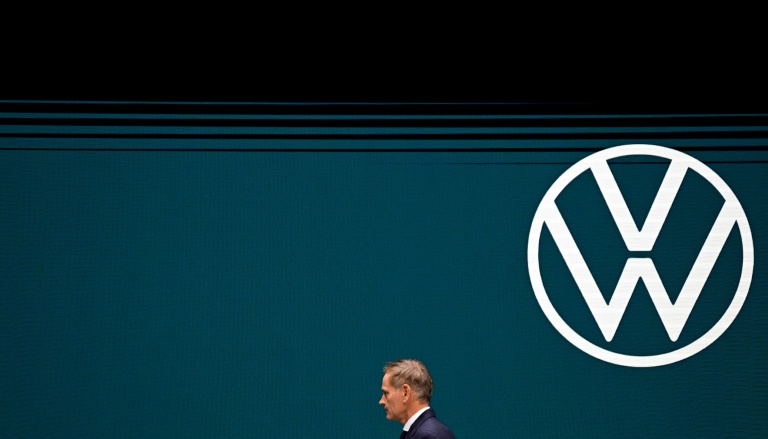Top Stories
Volkswagen Reports €1.07 Billion Loss Amid Tariff Struggles

UPDATE: Volkswagen has just reported its first quarterly loss in five years, posting a staggering €1.07 billion ($1.24 billion) deficit for the July-to-September period. This alarming figure highlights the severe impact of US tariffs and ongoing challenges with its electric vehicle transition at subsidiary Porsche.
The latest financial results mark the first loss for Europe’s largest car manufacturer since the second quarter of 2020, when the COVID-19 pandemic severely affected operations. Volkswagen’s finance chief, Arno Antlitz, stated that the fallout from US tariffs is costing the company a whopping €5 billion annually.
“
Higher tariffs, adjusting the product strategy at Porsche, and write-downs to Porsche’s value cost €7.5 billion,”
Antlitz revealed, reflecting the mounting pressures facing the automotive giant. This news comes amid a broader decline in the German auto industry, which is grappling with fierce competition in the critical market of China and a slower-than-anticipated shift to electric vehicles.
Volkswagen’s troubles with Porsche, once a shining star in its portfolio, are becoming increasingly pronounced. The sports car brand has reduced its profit targets and plans to sell petrol vehicles longer than initially expected, which has led to significant adjustments in Volkswagen’s overall strategy. In September, the company warned of a potential €5.1 billion hit to its core profit for the year.
The company is also facing 15 percent tariffs on car exports to the United States, a significant jump from the 2.5 percent rate that existed before former President Donald Trump initiated a trade war in April 2018. Although the rate was reduced from an earlier level of 27.5 percent, it remains a substantial burden for the carmaker, which also imports parts from outside North America.
Despite the net loss, Volkswagen reported a 2.3 percent increase in revenues, reaching €80.3 billion, aided by a slight uptick in global vehicle sales. However, the company acknowledges that the burden of tariffs will persist. Antlitz stated, “It is not really appropriate to exclude it from the calculation.”
As Volkswagen navigates these turbulent waters, it is also implementing significant workforce reductions. The company previously agreed to cut 35,000 jobs by 2030, primarily at its flagship brand, as part of a plan to save €15 billion annually.
The automotive sector’s instability is compounded by Porsche’s recent announcement of further cost-cutting measures, indicating that its business model needs reevaluation. In a move to address these challenges, Porsche appointed ex-McLaren head Michael Leiters as its new CEO, effective January 1, 2026, succeeding Oliver Blume, who also leads the Volkswagen Group.
With both Volkswagen and Porsche facing unprecedented challenges, the outlook remains uncertain. Investors and unions are closely monitoring the situation, as concerns grow over the effectiveness of Blume’s dual leadership roles amid ongoing crises.
As these developments unfold, stakeholders in the automotive industry and consumers alike will be watching closely to see how Volkswagen adapts to the shifting landscape and navigates the pressures of tariffs, competition, and an evolving market.
This urgent news signals troubling times for Volkswagen, and the implications for the broader auto industry could be significant. Stay tuned for updates as the situation develops.
-

 World3 months ago
World3 months agoScientists Unearth Ancient Antarctic Ice to Unlock Climate Secrets
-

 Entertainment4 months ago
Entertainment4 months agoTrump and McCormick to Announce $70 Billion Energy Investments
-

 Lifestyle4 months ago
Lifestyle4 months agoTransLink Launches Food Truck Program to Boost Revenue in Vancouver
-

 Science4 months ago
Science4 months agoFour Astronauts Return to Earth After International Space Station Mission
-

 Technology2 months ago
Technology2 months agoApple Notes Enhances Functionality with Markdown Support in macOS 26
-

 Top Stories3 weeks ago
Top Stories3 weeks agoUrgent Update: Fatal Crash on Highway 99 Claims Life of Pitt Meadows Man
-

 Sports4 months ago
Sports4 months agoSearch Underway for Missing Hunter Amid Hokkaido Bear Emergency
-

 Politics3 months ago
Politics3 months agoUkrainian Tennis Star Elina Svitolina Faces Death Threats Online
-

 Technology4 months ago
Technology4 months agoFrosthaven Launches Early Access on July 31, 2025
-

 Politics3 months ago
Politics3 months agoCarney Engages First Nations Leaders at Development Law Summit
-

 Entertainment4 months ago
Entertainment4 months agoCalgary Theatre Troupe Revives Magic at Winnipeg Fringe Festival
-

 Top Stories6 days ago
Top Stories6 days agoFamily Remembers Beverley Rowbotham 25 Years After Murder



















